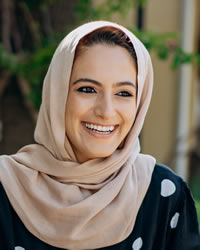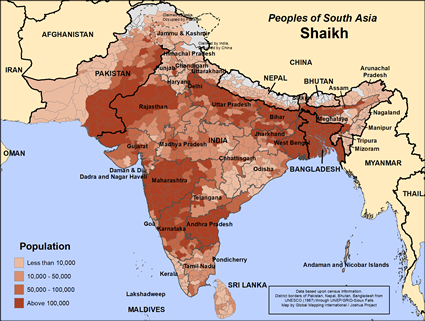DISCLAIMER:
*** Joshua Project has strong reason to believe the actual population of Shaikh in India could be as low as 20% of the current number reported. Updated information will appear here when available. ***
The term Shaikh is used for a sociocultural group that originated with Arab settlers in South Asia which now includes many subgroups. Islam arrived in the area now known as Pakistan in 711 AD when a Muslim Arab army conquered the northwestern part of the Indus Valley from Jammu and Kashmir to the Arabian Sea. Technocrats, bureaucrats, soldiers, traders, scientists, architects, teachers, theologians, and Sufis flocked from the rest of the Arab and Muslim world to the Islamic Sultanate in South Asia and settled permanently. The descendants of these Arabs usually go by the title of Shaikh and are also known in Pakistan as Muslim Khatri. They are a sub-group of the Zamindar group traditionally associated with farming, which is one of the two groups making up the Punjabis. Shaikh is also a term that is usually attributed to the leaders or elders of Arabian social groups. After the advent of Islam in South Asia, some high caste (Brahmins, Muslim Rajputs and Khatris) converted to Islam in the Punjab region and adopted the Shaikh title. They are known as Punjabi Shaikh. The majority of the Punjabi Shaikhs are urbanized and detached from their traditional agricultural ancestry. However, a few families still cultivate their own land in the western districts of Punjab. The main professions of the urban Punjabi Shaikhs are business and public service. They are often stereotyped for their reputation for business acumen. The main language of the Shaikh is Urdu. They also speak the local languages of the areas where they live.
The large south Asian caste of Shaikhs is not bound by one particular profession. The Shaikh can be broadly grouped into five communities. The majority of the Punjabi Shaikhs are urbanized and detached from their traditional agricultural ancestry. However, a few families still cultivate their own land in the western districts of Punjab. The main professions of the urban Punjabi Shaikhs are business and public service. They are often stereotyped for their business acumen. Common surnames are Mondal, Siddiqui, Usmani, Faroqui and Sheikh. The Shaikhs marry within their group. Families arrange marriages. Marriage to one spouse is the norm but a man may marry more wives if he can afford them. Sons inherit property. As Muslims, they will not eat pork.
The Shaikhs profess Islam and have both Sunni and Shia traditions among them. Both groups try to obey the teachings of the Koran and the prophet Mohammad. They believe that by following the Five Pillars of Islam that they will attain heaven when they die. However, Allah, the supreme God of the universe, determines who enters paradise. Sunnis pray five times a day facing Mecca. They fast the month of Ramadan. They attend mosque services on Friday. If a Muslim has the means, he or she will make a pilgrimage to Mecca once in his or her lifetime. Muslims are also prohibited to drink alcohol, eat pork, gamble, steal, use deceit, slander, and make idols. The two main holidays for Sunni Muslims are Eid al Fitr, the breaking of the monthly fast and Eid al Adha, the celebration of Abraham's willingness to sacrifice his son to Allah.
There has been much ministry activity among the Shaikh in India. Unfortunately, these efforts have brought few Shaikh into God's kingdom. Shaikhs who live in rural villages often lack access to modern medicine, electricity and clean water. Teams of believers can help meet these needs.
Ask the Lord to open the hearts of the Shaikhs so they will receive the good news.
Pray for a disciple making movement that will bless the Shaikhs this decade.
Pray for the Lord to send workers to the Shaikhs to tell them about Jesus or Isa.
Scripture Prayers for the Shaikh unspecified in India.
| Profile Source: Keith Carey |












